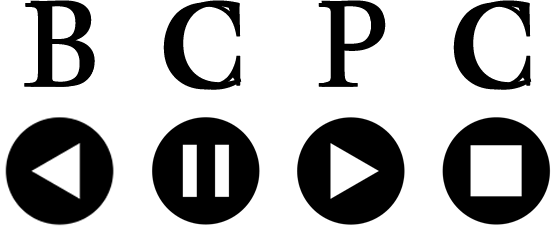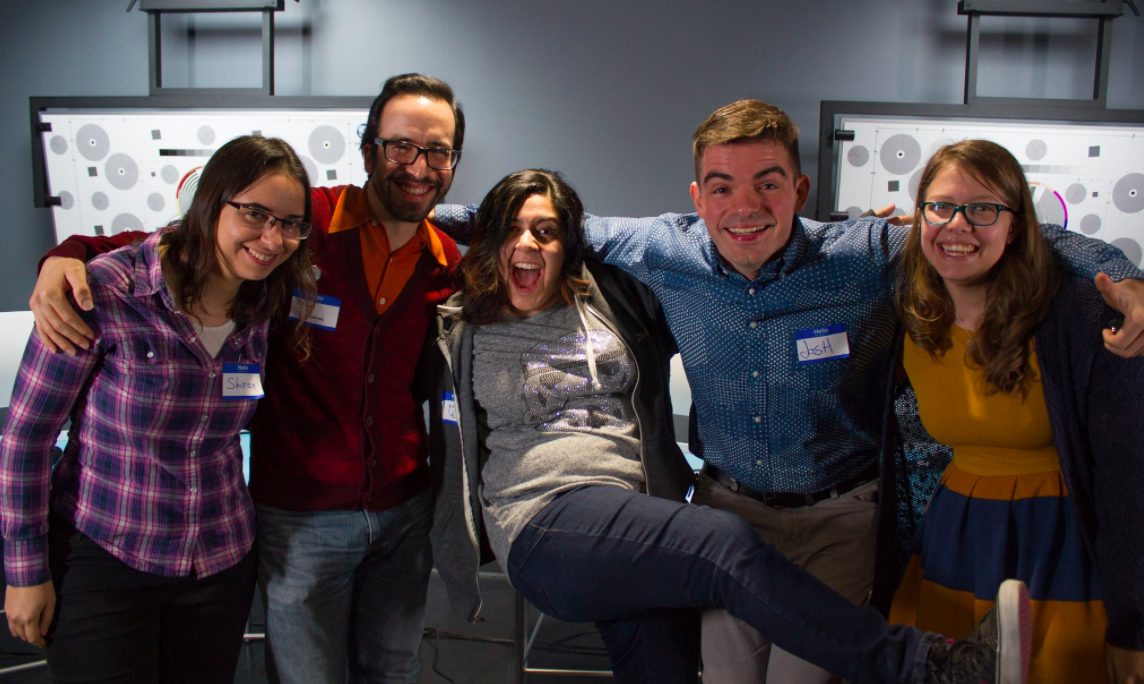BCPC Member Highlight: Rachael Knudsen (New York)
/
#MemberHighlight
BCPC encompasses the whole spectrum of post professionals, in every discipline, at every stage of their career, on every continent in the world. It also includes a few of our post-adjacent friends! Every couple of weeks we interview one BCPC member, as part of our #MemberHighlight program. This program aims to celebrate the wide range of voices and backgrounds that make up our community.
10 years ago I was a producer on the show 16 & Pregnant and so was Rachael Knudsen. We had desks facing each other and became fast friends. As we both grew professionally, I really wanted to continue working with her, but if we were both producers that wouldn't happen. I was drawn to editing and the bonus of my career switch was that I could be a team with my best friend crafting stories together. And that's exactly what happened. So, now I have the pleasure of sharing her experience as a producer over the past decade with all of you!
---
Give a brief summary of your trajectory into post in New York City...
I've worked as a producer in television for over a decade in NYC, both producing and directing in field and in post. But one of the first jobs I got after college was an associate producer gig on a weekly Food Network web series, where I was on a two-person team developing, producing, shooting, and editing short behind-the-scenes spots for the network every week. I'm still not sure how or why I got this job, but it truly was a great bootcamp. I had taken some Final Cut editing classes in college, however Food Network was Avid based. And I remember thinking, "Avid can't be that different from Final Cut, right? I'll just say I have 'some' experience with Avid and figure it out." I basically spent the next year, pulling all-nighters learning how to stumble my way through the software. I don't know how much I'd promote fibbing on your resume to get ahead, but I was willing to put in the extra hours and never delivered anything short of what I promised, so in this case, my "fake it until you make it" worked out. Over the next ten years, I produced shows for MTV, Lifetime, LMN, Animal Planet, (mostly docu-series) and now, I'm currently producing at Viceland.
What do you love about being a supervising/co-executive producer with lots of post experience?
Personally, I feel like post experience is a must for anyone looking to create content in the field or on a set. How can you possibly be efficient and ultimately more creative as a director/producer/writer, if you haven't spent some time being yelled at by editors? I kid, I kid (kind of). My time spent editing and with editors has been the greatest tool on set to really know if the puzzle pieces I am getting for our project are the right ones. It has given me a clearer understanding for what edit schedules are feasible or unreasonable to ask of a team.
How would you describe your approach to producing story? What is it important for emerging producers to know?
Know thy footage. I think that's one of the biggest assets a story producer can provide a post team – know every cutaway, every word, or where to find it. And when problems arise or notes come, you can quickly point to a solution. Also – clarity is king. I can think of a million ways this rule should be broken, but generally, I feel like it's easier to point to what's entertaining in raw footage, and usually much harder to point to "what is our story and does this piece of footage serve it."
Talk about your workflow from raw footage to a finished product in collaboration with the ideal editor.
This truly depends on the timeline and project. But ideally for docu-series, I prefer to prep stringouts for the editor and write up a clear outline of the beginning/middle/end with intention of the scene/act/episode before the editor comes on board. I watch everything down once with only cutting obvious lifts as I go. Then every time after that first watch, I cut down the content in half until I get to a sequence that's no more than 3x the desired length of the scene (if the final scene should be 5 min, I'm ideally never giving an editor more than 15 min in my stringout). I also save each version of the stringout, so I can always go back to a longer selects sequence if needed. I often put locators on the most important or favorite moments, and make sure to set-aside good b-roll or cutaways that might get lost in the process. I definitely prefer time for editors to watch as much raw footage as possible, and ideally everything is transcribed, as well. Then after the editor has enough time with the footage/selects/outlines, we talk and brainstorm a story plan and continue a back and forth as needed until a rough cut is assembled. Sometimes music is important to hear with a sequence, but I prefer to watch early for story flow. I also like to watch down cuts together with the editor in the room whenever possible – watching a cut alone on a computer, where you're tempted to stop/start to jot down notes, always interferes with how a cut can feel in a room. Viceland uses the online platform Frame IO, which allows you to share cuts and put notes online at specific timecodes. This has been really helpful to consolidate notes when multiple people are weighing in on the same cut. Anyone else's overall workflow sound similar? Always curious if editors overall prefer papercuts or stringouts before an edit starts....!
What and where is your favorite place to unwind after a long day? How do you self-care?
Self-care?! So important, and something I admittedly suck at. Does listening to podcasts that tell me the world is on fire during my walk home from work count? Or binging on green tea mochi ice cream? If so, I do both.
What should producers know about post-production / technology? What technical skills have helped you? What did you wish you knew about post when you started out?
All producers should know how to navigate edit software (Avid/Premiere seem to be the two programs in the lead in companies these days, yeah?). Knowing how to make string-outs and being able to place and rearrange footage in a timeline is essential, IMO. I'm baffled when I come across story producers who don't have a basic working knowledge of edit software. We live in a time where free-trials and tutorials are in abundance online – take advantage of this and up your skills that you bring to the table. Because if you don't, someone else will take your seat.
What is the the one thing outside of your work that you geek out about the most?
Cats. I love cats. The IRL animal not the 1980's hit musical.
What is the best advice that has ever been given to you?
You can never get back your first reaction to material. Watching and re-watching material can leave us all numb to what's working or not. So I try to make note of what grabs me or what I think is important/good the very first time I see raw footage, and then I do the same when I first see a new cut. That way, when we all start to get numb to the material after weeks of an edit, I can go back to the document and say, "We can't get rid of this, because I was rolling on the floor with laughter the first time." Or "this worked for me the first time, so actually let's not futz with it." Or "this part has always confused me, so actually let's revisit."
What achievement are you most proud of?
About ten years ago when I was a total producer newb, I co-shot, wrote, field produced, and post produced MTV's first special on abortion – before that, the only time abortion had even been talked about on the network was in 1993 on the Real World. So that has always felt neat to me. ALSO, I brought my lunch to work today instead of spending $14 on a kale salad, so that felt pretty monumental too.
If you won the lottery today, and never needed to work again, how would you spend the rest of your life?
I'd like to say that I'd LIVE–LAUGH–LOVE my way through every country possible on Delta One, give all my family members a debt-free life, and fund lots of charities and meaningful projects. But also, I've always wanted to star in infomercials, so I'd probably fund a series of products that Julianne veggies and steam laundry, so that I could sell them to you via 2am television.
What are people always surprised to learn about you?
That I genuinely love the movie, "Cool As Ice." (Oddly, the cinematographer went on to DP "Schindler's List" two years later). And maybe people are also surprised that I want to star in infomercials one day? However, I'm pretty sure nobody is surprised that kale salads cost $14 now – although this lack of surprise, surprises me.
If you could time-travel, where and when would you go?
(SORRY CAN'T THINK OF ANYTHING GOOD ENOUGH!!)
What inspired you to be a member of the BCPC and how long have you been with us?
I've been apart of the the BCPC community pretty much since the beginning. One of the founding members, Janis Vogel, is a very close friend, and when I'm super lucky, she's also a colleague of mine. So when Janis said she was helping to start this group to support and connect emerging talent in post production, I showed up! Because as a general rule of thumb of mine, Janis knows best. I mostly enjoy lurking within conversations and articles posted on the BCPC Facebook page. But this community is also a great pool to find hires from within, and every time I've come to a meet-up, I've walked away more inspired and tipsy than when I showed up.












